IT’S EMMAHSALES
Hi there yes, I know how tiresome it can get, to get those assignments over and done with, worry no more get the best guides and much more on this platform.
- 99
- 0
- 0
Community
- Followers
- Following
99 items

Leadership and Management of Patient care #11
Definition of Leadership Process of influence Way of behaving, an interpersonal ability to cause others to respond, not because they have to but because they want to Characteristics of Leadership 1. Positive interactions/Attitude 2. Takes initiative: questioning why? 3. Energy 4. Positive attitude 5. Respect 6. Professional development: becoming an expert in you field 7. Empowerment 8. Problem solving and critical thinking skills 9. Emphasize interpersonal development/communication ...
- Exam (elaborations)
- • 357 pages •
Definition of Leadership Process of influence Way of behaving, an interpersonal ability to cause others to respond, not because they have to but because they want to Characteristics of Leadership 1. Positive interactions/Attitude 2. Takes initiative: questioning why? 3. Energy 4. Positive attitude 5. Respect 6. Professional development: becoming an expert in you field 7. Empowerment 8. Problem solving and critical thinking skills 9. Emphasize interpersonal development/communication ...

ENPC EXAMS QUESTIONS AND ANSWERS 2022
Which of the following would be an abnormal finding in a patient with glomerulonephritis? Clear urine There is a decrease in urine output for patient's with glomerulonephritis. Urine would be concentrated and dark brown/tea-colored. Decreased energy Hypertension Nausea, vomiting 2. A 3-year-old is brought to the emergency department with a 2-day history of a runny nose, low- grade fever, and a "barky" cough at night. The caregiver tells the emergency department nurse the c...
- Exam (elaborations)
- • 22 pages •
Which of the following would be an abnormal finding in a patient with glomerulonephritis? Clear urine There is a decrease in urine output for patient's with glomerulonephritis. Urine would be concentrated and dark brown/tea-colored. Decreased energy Hypertension Nausea, vomiting 2. A 3-year-old is brought to the emergency department with a 2-day history of a runny nose, low- grade fever, and a "barky" cough at night. The caregiver tells the emergency department nurse the c...
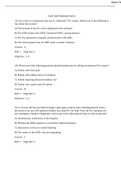
EMT MIDTERM REVIEW
23) You work in a community that has an “enhanced” 911 system. Which one of the following is true about that system? A) The location of the 911 call is displayed to the call taker. B) The EMS system uses EMTs, Advanced EMTs, and paramedics. C) The fire department responds simultaneously with EMS. D) The total response time for EMS rarely exceeds 9 minutes. Answer: A Diff: 1 Page Ref: 4 Objective: 1-4 24) Which one of the following patients should benefit most by calling an enhance...
- Exam (elaborations)
- • 149 pages •
23) You work in a community that has an “enhanced” 911 system. Which one of the following is true about that system? A) The location of the 911 call is displayed to the call taker. B) The EMS system uses EMTs, Advanced EMTs, and paramedics. C) The fire department responds simultaneously with EMS. D) The total response time for EMS rarely exceeds 9 minutes. Answer: A Diff: 1 Page Ref: 4 Objective: 1-4 24) Which one of the following patients should benefit most by calling an enhance...
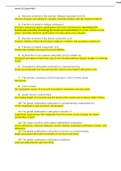
EMT FINAL
1. Which of the following courses requires about 150 hours of training? A. EMR B. AEMT C. EMT D. Paramedic 2. National guidelines for EMS care are intended to __________. A. reduce expenses at the local and state levels B. provide more consistent delivery of EMS care across the United States C. facilitate a national EMS labor group D. unify EMS providers under a single medical director 3. What is an EMT's primary service area? A. The main area in which the EMS agency operates B. T...
- Exam (elaborations)
- • 83 pages •
1. Which of the following courses requires about 150 hours of training? A. EMR B. AEMT C. EMT D. Paramedic 2. National guidelines for EMS care are intended to __________. A. reduce expenses at the local and state levels B. provide more consistent delivery of EMS care across the United States C. facilitate a national EMS labor group D. unify EMS providers under a single medical director 3. What is an EMT's primary service area? A. The main area in which the EMS agency operates B. T...
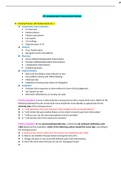
ATI Fundamentals Proctored Exam Review
Nursing Process- ATI Fundamentals Ch. 7 Assessment/ Data Collection Pt. interview Medical history Physical assessment Lab reports S/S, feelings Objective data VS Analysis ID pt. health status Recognize trends and patterns Planning Nurse initiated/Independent Interventions Provider-Initiated/Dependent interventions Collaborative interventions Establish priorities
- Exam (elaborations)
- • 31 pages •
Nursing Process- ATI Fundamentals Ch. 7 Assessment/ Data Collection Pt. interview Medical history Physical assessment Lab reports S/S, feelings Objective data VS Analysis ID pt. health status Recognize trends and patterns Planning Nurse initiated/Independent Interventions Provider-Initiated/Dependent interventions Collaborative interventions Establish priorities
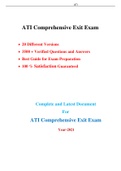
ATI Comprehensive Exit Exam
10) A nurse is caring for a client who has chronic kidney disease. The nurse should identify which of the following laboratory values as in an indication for hemodialysis? a) glomerular filtration rate of 14 mL/ minute b) BUN 16 mg/DL c) serum magnesium 1.8 mg mg/dl d) Serum phosphorus 4.0 mg/dL 11) A nurse is caring for an infant who has a prescription for continuous pulse oximetry. The following is an appropriate action for the nurse to take? a) Placed infant under radiant warmer b) M...
- Exam (elaborations)
- • 984 pages •
10) A nurse is caring for a client who has chronic kidney disease. The nurse should identify which of the following laboratory values as in an indication for hemodialysis? a) glomerular filtration rate of 14 mL/ minute b) BUN 16 mg/DL c) serum magnesium 1.8 mg mg/dl d) Serum phosphorus 4.0 mg/dL 11) A nurse is caring for an infant who has a prescription for continuous pulse oximetry. The following is an appropriate action for the nurse to take? a) Placed infant under radiant warmer b) M...
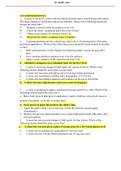
ATI COMPREHENSIVE C
1. A nurse is caring for a client who has bipolar disorder and is experiencing acute mania. The nurse obtained a verbal prescription for restraints. Which of the following should the actions the nurse take? A. Request a renewal of the prescription every 8 hr. B. Check the client’s peripheral pulse rate every 30 min C. Obtain a prescription for restraint within 4 hr. D. Document the client’s condition every 15 minutes 2. A nursing planning care for a school-age child who is 4 hr postop...
- Exam (elaborations)
- • 40 pages •
1. A nurse is caring for a client who has bipolar disorder and is experiencing acute mania. The nurse obtained a verbal prescription for restraints. Which of the following should the actions the nurse take? A. Request a renewal of the prescription every 8 hr. B. Check the client’s peripheral pulse rate every 30 min C. Obtain a prescription for restraint within 4 hr. D. Document the client’s condition every 15 minutes 2. A nursing planning care for a school-age child who is 4 hr postop...
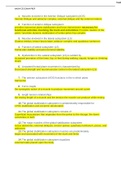
NASM CES EXAM PREP
1. Muscles involved in the Anterior Oblique subsystem (AOS) Internal Oblique and adductor complex, external oblique and hip external rotators 2. Function of anterior oblique subsystem provides transverse plane stabilization and force transmission necessary for functional activities involving the trunk and extremities Provides rotation of the pelvis *provides dynamic stabilization of lumbo-pelvic-hip complex 3. Muscles involved in the lateral subsystem (LS) Gluteus medius, tensor fascia la...
- Exam (elaborations)
- • 83 pages •
1. Muscles involved in the Anterior Oblique subsystem (AOS) Internal Oblique and adductor complex, external oblique and hip external rotators 2. Function of anterior oblique subsystem provides transverse plane stabilization and force transmission necessary for functional activities involving the trunk and extremities Provides rotation of the pelvis *provides dynamic stabilization of lumbo-pelvic-hip complex 3. Muscles involved in the lateral subsystem (LS) Gluteus medius, tensor fascia la...
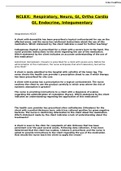
NCLEX: Respiratory, Neuro, GI, Ortho Cardio GI, Endocrine, Integumentary
Integumentary NCLEX A client with dermatitis has been prescribed a topical corticosteroid for use on the affected areas, and the nurse has reinforced instructions about the use of this medication. Which statement by the client indicates a need for further teaching? Collagenase (Santyl) is prescribed for a client with a severe burn to the hand. The nurse provides instructions to the client regarding the use of the medication. Which statement by the client indicates an accurate understanding...
- Exam (elaborations)
- • 143 pages •
Integumentary NCLEX A client with dermatitis has been prescribed a topical corticosteroid for use on the affected areas, and the nurse has reinforced instructions about the use of this medication. Which statement by the client indicates a need for further teaching? Collagenase (Santyl) is prescribed for a client with a severe burn to the hand. The nurse provides instructions to the client regarding the use of the medication. Which statement by the client indicates an accurate understanding...
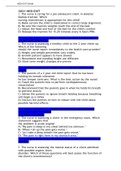
2021 HESI EXIT
1. The nurse is caring for a pre-adolescent client in skeletal Dunlop traction. Which nursing intervention is appropriate for this child? A) Make certain the child is maintained in correct body alignment. B) Be sure the traction weights touch the end of the bed. C) Adjust the head and foot of the bed for the child's comfort D) Release the traction for 15-20 minutes every 6 hours PRN. The correct answer is A: Make certain the child is maintained in correct body alignment. 2. The nurse i...
- Exam (elaborations)
- • 36 pages •
1. The nurse is caring for a pre-adolescent client in skeletal Dunlop traction. Which nursing intervention is appropriate for this child? A) Make certain the child is maintained in correct body alignment. B) Be sure the traction weights touch the end of the bed. C) Adjust the head and foot of the bed for the child's comfort D) Release the traction for 15-20 minutes every 6 hours PRN. The correct answer is A: Make certain the child is maintained in correct body alignment. 2. The nurse i...
